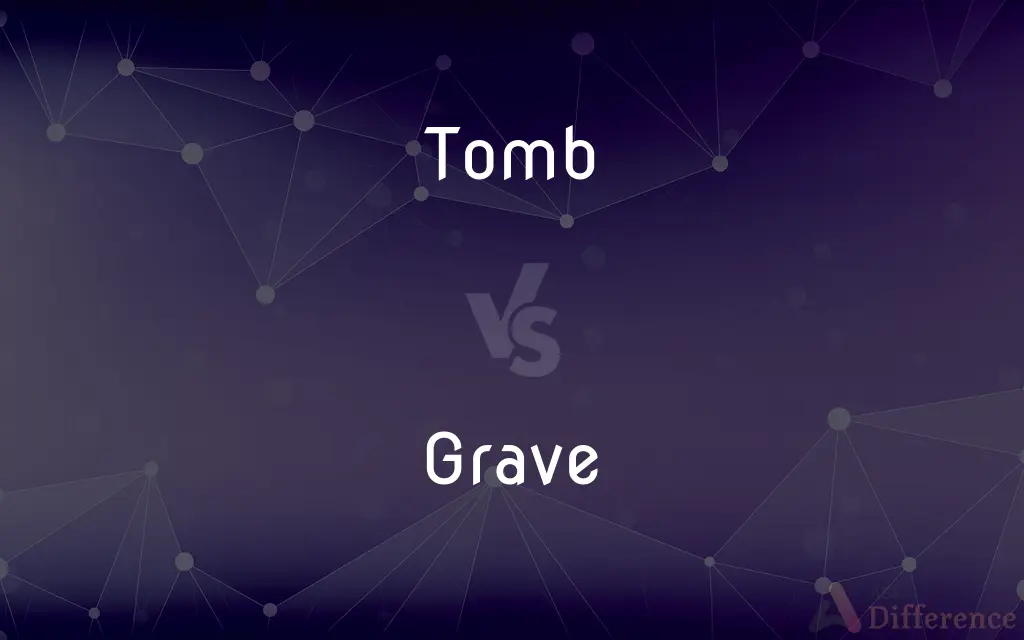Tomb vs. Grave — What's the Difference?
Edited by Tayyaba Rehman — By Fiza Rafique — Updated on November 6, 2023
A tomb is a structure for the dead; a grave is a dug out space in the ground for burial.

Difference Between Tomb and Grave
Table of Contents
ADVERTISEMENT
Key Differences
A tomb is often a constructed space, such as a mausoleum or vault, designed to house the dead, often seen in historical or affluent contexts. These structures can be above ground or in a chamber and are typically more elaborate. Graves, on the other hand, are usually below-ground burial spots marked by a simple headstone or marker. While tombs can be ornate and communal, graves are often singular resting places, simpler in design.
Tombs have been part of ancient civilizations, reflecting architectural prowess like the Pyramids of Egypt, designed to honor and memorialize the deceased. They are enduring through centuries, becoming historical landmarks. Graves tend to be personal and less grandiose, with their simplicity aiming to respect and remember the individual without the permanence or grandeur of tombs.
While tombs can be sites of pilgrimage and tourist interest, such as the Taj Mahal, due to their cultural significance and artistry, graves typically do not attract such widespread attention. They serve more for personal mourning and remembrance, with a focus on providing peace to the departed in a quiet, reflective space.
Tombs can sometimes become family heritages, housing generations of deceased, indicating lineage and legacy. Graves are more often for individual burials, with family plots consisting of several adjacent graves rather than a shared structure. This distinction speaks to the social and cultural differences in how societies handle the concept of death and memory.
In modern usage, the term 'tomb' may also be metaphorical, referring to anything that houses the dead, while 'grave' has maintained a literal association with the act of burial. Thus, tombs can signify hist
ADVERTISEMENT
Comparison Chart
Definition
A chamber or structure for burial
An excavation in the ground for burial
Construction
Often elaborate and above ground
Simple and directly in the earth
Permanence
Designed to last and be visited
Typically not intended for visitation
Cultural Significance
Can be significant, reflecting art and history
Personal and understated significance
Usage
Can be metaphorical for any structure housing the dead
Primarily literal, associated with the act of burial
Compare with Definitions
Tomb
A large, permanent structure for burial.
The Pharaoh's tomb was adorned with priceless treasures.
Grave
An individual burial spot, usually marked by a stone.
The grave had been lovingly tended, with fresh flowers laid atop.
Tomb
A chamber in a cemetery marking a resting place.
The old cemetery had tombs that dated back centuries.
Grave
A grave is a location where a dead body (typically that of a human, although sometimes that of an animal) is buried or interred after a funeral. Graves are usually located in special areas set aside for the purpose of burial, such as graveyards or cemeteries.Certain details of a grave, such as the state of the body found within it and any objects found with the body, may provide information for archaeologists about how the body may have lived before its death, including the time period in which it lived and the culture that it had been a part of.
Tomb
A symbolic or commemorative structure for the deceased.
The war hero was honored with a stately tomb in the nation's capital.
Grave
A hole dug in the ground to receive a coffin or dead body, typically marked by a stone or mound
The coffin was lowered into the grave
A mass grave
Tomb
A large vault, typically an underground one, for burying the dead.
Grave
Another term for grave accent
Tomb
A vault for the dead, often above ground.
We visited the family tomb on the anniversary of our ancestor's death.
Grave
Giving cause for alarm; serious
A matter of grave concern
Tomb
A tomb (Greek: τύμβος tumbos) is a repository for the remains of the dead. It is generally any structurally enclosed interment space or burial chamber, of varying sizes.
Grave
Serious or solemn in manner or appearance
His face was grave
Tomb
A grave or other place of burial.
Grave
(as a direction) slowly; with solemnity.
Tomb
A vault or chamber for burial of the dead.
Grave
Engrave (an inscription or image) on a surface
Marble graved with exquisite flower, human and animal forms
Tomb
A monument commemorating the dead.
Grave
Clean (a ship's bottom) by burning off the accretions and then tarring it
They graved the ship there and remained 26 days
Tomb
A small building (or "vault") for the remains of the dead, with walls, a roof, and (if it is to be used for more than one corpse) a door. It may be partly or wholly in the ground (except for its entrance) in a cemetery, or it may be inside a church proper or in its crypt. Single tombs may be permanently sealed; those for families (or other groups) have doors for access whenever needed.
Grave
(as a direction) slowly; with solemnity.
Tomb
A pit in which the dead body of a human being is deposited; a grave.
Grave
An excavation for the interment of a corpse.
Tomb
One who keeps secrets.
Grave
A place of burial.
Tomb
(transitive) To bury.
Grave
Death or extinction
Faced the grave with calm resignation.
Tomb
A pit in which the dead body of a human being is deposited; a grave; a sepulcher.
As one dead in the bottom of a tomb.
Grave
See grave accent.
Tomb
A house or vault, formed wholly or partly in the earth, with walls and a roof, for the reception of the dead.
Grave
Requiring serious thought; momentous
A grave decision in a time of crisis.
Tomb
A monument erected to inclose the body and preserve the name and memory of the dead.
Hang her an epitaph upon her tomb.
Grave
Fraught with danger or harm
A grave wound.
Tomb
To place in a tomb; to bury; to inter; to entomb.
I tombed my brother that I might be blessed.
Grave
Dignified and somber in conduct or character
A grave procession.
Tomb
A place for the burial of a corpse (especially beneath the ground and marked by a tombstone);
He put flowers on his mother's grave
Grave
Somber or dark in hue.
Tomb
A historical monument containing burials.
The ancient tomb revealed much about the civilization's burial practices.
Grave
Written with or modified by the mark ( ` ), as the è in Sèvres.
Grave
Of or referring to a phonetic feature that distinguishes sounds produced at the periphery of the vocal tract, as in labial and velar consonants and back vowels.
Grave
To sculpt or carve; engrave.
Grave
To stamp or impress deeply; fix permanently.
Grave
To clean and coat (the bottom of a wooden ship) with pitch.
Grave
An excavation in the earth as a place of burial
Grave
Any place of interment; a tomb; a sepulcher.
Grave
(by extension) Death, destruction.
Grave
(by extension) Deceased people; the dead.
Grave
A written accent used in French, Italian, and other languages. è is an e with a grave accent (`).
Grave
(historical) A count, prefect, or person holding office.
Grave
To dig.
Grave
To carve or cut, as letters or figures, on some hard substance; to engrave.
Grave
To carve out or give shape to, by cutting with a chisel; to sculpture.
To grave an image
Grave
To impress deeply (on the mind); to fix indelibly.
Grave
To entomb; to bury.
Grave
To write or delineate on hard substances, by means of incised lines; to practice engraving.
Grave
Characterised by a dignified sense of seriousness; not cheerful.
Grave
Low in pitch, tone etc.
Grave
Serious, in a negative sense; important, formidable.
Grave
Dull, produced in the middle or back of the mouth. (See Grave and acute)
Grave
(obsolete) Influential, important; authoritative.
Grave
To clean, as a vessel's bottom, of barnacles, grass, etc., and pay it over with pitch; - so called because graves or greaves was formerly used for this purpose.
Grave
To dig. [Obs.] Chaucer.
He hath graven and digged up a pit.
Grave
To carve or cut, as letters or figures, on some hard substance; to engrave.
Thou shalt take two onyx stones, and grave on them the names of the children of Israel.
Grave
To carve out or give shape to, by cutting with a chisel; to sculpture; as, to grave an image.
With gold men may the hearte grave.
Grave
To impress deeply (on the mind); to fix indelibly.
O! may they graven in thy heart remain.
Grave
To entomb; to bury.
Lie full low, graved in the hollow ground.
Grave
To write or delineate on hard substances, by means of incised lines; to practice engraving.
Grave
Of great weight; heavy; ponderous.
His shield grave and great.
Grave
Of importance; momentous; weighty; influential; sedate; serious; - said of character, relations, etc.; as, grave deportment, character, influence, etc.
Most potent, grave, and reverend seigniors.
A grave and prudent law, full of moral equity.
Grave
Not light or gay; solemn; sober; plain; as, a grave color; a grave face.
Grave
Not acute or sharp; low; deep; - said of sound; as, a grave note or key.
The thicker the cord or string, the more grave is the note or tone.
Grave
Slow and solemn in movement.
Grave
An excavation in the earth as a place of burial; also, any place of interment; a tomb; a sepulcher. Hence: Death; destruction.
He bad lain in the grave four days.
Grave
Death of a person;
He went to his grave without forgiving me
From cradle to grave
Grave
A place for the burial of a corpse (especially beneath the ground and marked by a tombstone);
He put flowers on his mother's grave
Grave
A mark (`) placed above a vowel to indicate pronunciation
Grave
Shape (a material like stone or wood) by whittling away at it;
She is sculpting the block of marble into an image of her husband
Grave
Carve, cut, or etch into a material or surface;
Engrave a pen
Engraved the winner's name onto the trophy cup
Grave
Dignified and somber in manner or character and committed to keeping promises;
A grave God-fearing man
A quiet sedate nature
As sober as a judge
A solemn promise
The judge was solemn as he pronounced sentence
Grave
Causing fear or anxiety by threatening great harm;
A dangerous operation
A grave situation
A grave illness
Grievous bodily harm
A serious wound
A serious turn of events
A severe case of pneumonia
A life-threatening disease
Grave
Of great gravity or crucial import; requiring serious thought;
Grave responsibilities
Faced a grave decision in a time of crisis
A grievous fault
Heavy matters of state
The weighty matters to be discussed at the peace conference
Grave
A hole dug in the ground for burial.
A simple wooden cross marked the grave at the roadside.
Grave
A final resting place in the earth for a dead body.
Family members gathered around the grave to pay their respects.
Grave
A place of burial associated with solemnity.
The funeral procession slowly made its way to the open grave.
Grave
A term for where one is laid to rest post-mortem.
The old soldier wished to be buried in a grave next to his fallen comrades.
Common Curiosities
Is a tomb always above ground?
Not always, but tombs are typically structures that can be above or within the ground, like crypts.
Are all graves marked?
Most graves have some form of marking, but not all are formally recognized with headstones.
Are mausoleums and tombs the same?
A mausoleum is a type of tomb, usually a free-standing building designed for the dead.
How long does a grave last?
A grave site can last indefinitely, but the marker's visibility may diminish over time without upkeep.
Do tombs preserve bodies better than graves?
Tombs, especially sealed ones, can slow decomposition, but they do not preserve bodies indefinitely.
Can a tomb be for multiple people?
Yes, tombs can be familial or communal, housing several deceased individuals.
Can anyone have a tomb?
While anyone can theoretically have a tomb, they are often more costly and associated with status or historical significance.
Are there legal differences between a tomb and a grave?
Legal distinctions can vary by location but often relate to the construction and maintenance standards.
What is a pauper's grave?
It is a grave for someone without the means for a private burial, often unmarked or with a simple marker.
Are graves reused?
In some places, grave plots can be reused after many years, especially in older European cemeteries.
Can a grave be above ground?
Traditional graves are below ground, but above-ground burials are possible in mausoleums.
Are the terms 'tomb' and 'grave' interchangeable?
While they can be related, they are not strictly interchangeable due to their different physical and cultural connotations.
Why might someone choose a tomb over a grave?
Personal preference, cultural practices, status, or a desire for a more lasting memorial can influence this choice.
What is a grave liner?
A grave liner is a protective enclosure that surrounds a coffin in a grave, often required by cemeteries to prevent ground collapse.
Is cremation considered a tomb or grave?
Cremation involves neither; however, urns with ashes can be kept in a tomb-like structure or buried in a grave.
Share Your Discovery

Previous Comparison
Singer vs. Songstress
Next Comparison
Probe vs. SensorAuthor Spotlight
Written by
Fiza RafiqueFiza Rafique is a skilled content writer at AskDifference.com, where she meticulously refines and enhances written pieces. Drawing from her vast editorial expertise, Fiza ensures clarity, accuracy, and precision in every article. Passionate about language, she continually seeks to elevate the quality of content for readers worldwide.
Edited by
Tayyaba RehmanTayyaba Rehman is a distinguished writer, currently serving as a primary contributor to askdifference.com. As a researcher in semantics and etymology, Tayyaba's passion for the complexity of languages and their distinctions has found a perfect home on the platform. Tayyaba delves into the intricacies of language, distinguishing between commonly confused words and phrases, thereby providing clarity for readers worldwide.















































